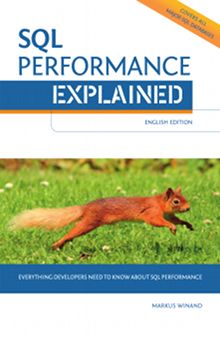This section contains the code and execution plans for Chapter 6Sorting and Grouping in a PostgreSQL database.
Indexed Order By
DROP INDEX sales_date;
CREATE INDEX sales_dt_pr ON sales (sale_date, product_id);
EXPLAIN
SELECT sale_date, product_id, quantity
FROM sales
WHERE sale_date = now() - INTERVAL '1' DAY
ORDER BY sale_date, product_id;The execution does not perform a sort operation:
QUERY PLAN
-----------------------------------------------------------
Index Scan using sales_dt_pr (cost=0.01..680.86 rows=376)
Index Cond: (sale_date = (now() - '1 day'::interval day))PostgreSQL uses the same execution plan, when sorting by PRODUCT_ID only.
EXPLAIN
SELECT sale_date, product_id, quantity
FROM sales
WHERE sale_date = now() - INTERVAL '1' DAY
ORDER BY product_id;Using an greater or equals condition requires an Sort operation:
EXPLAIN
SELECT sale_date, product_id, quantity
FROM sales
WHERE sale_date >= now() - INTERVAL '1' DAY
ORDER BY product_id;Although the row estimate got lower, causing the cost also to be lower:
QUERY PLAN
--------------------------------------------------------------
Sort (cost=8.50..8.50 rows=1 width=32)
Sort Key: product_id
-> Index Scan using sales_dt_pr (cost=0.00..8.49 rows=1)
Index Cond: (sale_date >= (now() - '1 day'::interval day))Indexing ASC, DESC and NULLS FIRST/LAST
Scanning an index backwards:
EXPLAIN
SELECT sale_date, product_id, quantity
FROM sales
WHERE sale_date >= now() - INTERVAL '1' DAY
ORDER BY sale_date DESC, product_id DESC;Mixing ASC and DESC causes an explicit sort:
EXPLAIN
SELECT sale_date, product_id, quantity
FROM sales
WHERE sale_date >= now() - INTERVAL '1' DAY
ORDER BY sale_date ASC, product_id DESC;Ordering the index with mixed ASC/DESC modifiers:
DROP INDEX sales_dt_pr;
CREATE INDEX sales_dt_pr
ON sales (sale_date ASC, product_id DESC);
EXPLAIN
SELECT sale_date, product_id, quantity
FROM sales
WHERE sale_date >= now() - INTERVAL '1' DAY
ORDER BY sale_date ASC, product_id DESC;PostgreSQL orders NULLS LAST per default. However, the DESC modifier puts them to the front, so that DESC NULLS LAST must sort explicitly:
EXPLAIN
SELECT sale_date, product_id, quantity
FROM sales
WHERE sale_date >= now() - INTERVAL '1' DAY
ORDER BY sale_date ASC, product_id DESC NULLS LAST;PostgreSQL allows explicit NULLS LAST indexing as well, so it becomes a pipelined order by again:
DROP INDEX sales_dt_pr;
CREATE INDEX sales_dt_pr
ON sales (sale_date ASC, product_id DESC NULLS LAST);
EXPLAIN
SELECT sale_date, product_id, quantity
FROM sales
WHERE sale_date >= now() - INTERVAL '1' DAY
ORDER BY sale_date ASC, product_id DESC NULLS LAST;Indexed Group By
The PostgreSQL (at least 9.0-13) database seems to have a little glitch, that makes the following not work as pipelined order by, when the index has NULLS LAST, as created above:
EXPLAIN
SELECT product_id, SUM(eur_value)
FROM sales
WHERE sale_date = now() - INTERVAL '1' DAY
GROUP BY product_id; QUERY PLAN
------------------------------------------------------------------------------------
HashAggregate (cost=574.21..574.53 rows=26 width=40)
Group Key: product_id
-> Index Scan using sales_dt_pr on sales (cost=0.43..572.62 rows=318 width=14)
Index Cond: (sale_date = (now() - '1 day'::interval day))
Removing the NULLS LAST clause from the index reveals something interesting:
DROP INDEX sales_dt_pr;
CREATE INDEX sales_dt_pr
ON sales (sale_date ASC, product_id DESC);
EXPLAIN
SELECT product_id, SUM(eur_value)
FROM sales
WHERE sale_date = now() - INTERVAL '1' DAY
GROUP BY product_id; QUERY PLAN
---------------------------------------------------------------------------------------------
GroupAggregate (cost=0.43..574.53 rows=26 width=40)
Group Key: product_id
-> Index Scan Backward using sales_dt_pr on sales (cost=0.43..572.62 rows=318 width=14)
Index Cond: (sale_date = (now() - '1 day'::interval day))The index is read backwards, although the SQL statement does not require it. It seems like PostgreSQL uses an GROUP BY PRODUCT_ID internally, to fetch the pre-sorted result. The next case adds an order by clause in opposite order.
EXPLAIN
SELECT product_id, SUM(eur_value)
FROM sales
WHERE sale_date = now() - INTERVAL '1' DAY
GROUP BY product_id
ORDER BY product_id DESC; QUERY PLAN
------------------------------------------------------------------------------------
GroupAggregate (cost=0.43..574.53 rows=26 width=40)
Group Key: product_id
-> Index Scan using sales_dt_pr on sales (cost=0.43..572.62 rows=318 width=14)
Index Cond: (sale_date = (now() - '1 day'::interval day))So, it seems that the implicit order by is not hardcoded. Our next test show that PostgreSQL can actually use such an index, but only if an explicit order by clause asks for the same order:
DROP INDEX sales_dt_pr;
CREATE INDEX sales_dt_pr
ON sales (sale_date ASC, product_id DESC NULLS LAST);
EXPLAIN
SELECT product_id, SUM(eur_value)
FROM sales
WHERE sale_date = now() - INTERVAL '1' DAY
GROUP BY product_id
ORDER BY product_id DESC NULLS LAST; QUERY PLAN
------------------------------------------------------------------------------------
GroupAggregate (cost=0.43..574.53 rows=26 width=40)
Group Key: product_id
-> Index Scan using sales_dt_pr on sales (cost=0.43..572.62 rows=318 width=14)
Index Cond: (sale_date = (now() - '1 day'::interval day))It does a pipelined group by, even when the index is defined NULLS LAST when the order by clause explicitly sorts the same way. Otherwise, it uses an internal order by clause that disregards the indexes NULLS specification.
Further testing shows that the problem exists for ASC indexes with NULLS FIRST:
DROP INDEX sales_dt_pr;
CREATE INDEX sales_dt_pr
ON sales (sale_date ASC, product_id ASC NULLS FIRST);
EXPLAIN
SELECT product_id, SUM(eur_value)
FROM sales
WHERE sale_date = now() - INTERVAL '1' DAY
GROUP BY product_id
ORDER BY product_id ASC NULLS FIRST; QUERY PLAN
------------------------------------------------------------------------------------
GroupAggregate (cost=0.43..574.53 rows=26 width=40)
Group Key: product_id
-> Index Scan using sales_dt_pr on sales (cost=0.43..572.62 rows=318 width=14)
Index Cond: (sale_date = (now() - '1 day'::interval day))But skipping order by clause:
EXPLAIN
SELECT product_id, SUM(eur_value)
FROM sales
WHERE sale_date = now() - INTERVAL '1' DAY
GROUP BY product_id; QUERY PLAN
------------------------------------------------------------------------------------
HashAggregate (cost=574.21..574.53 rows=26 width=40)
Group Key: product_id
-> Index Scan using sales_dt_pr on sales (cost=0.43..572.62 rows=318 width=14)
Index Cond: (sale_date = (now() - '1 day'::interval day))
